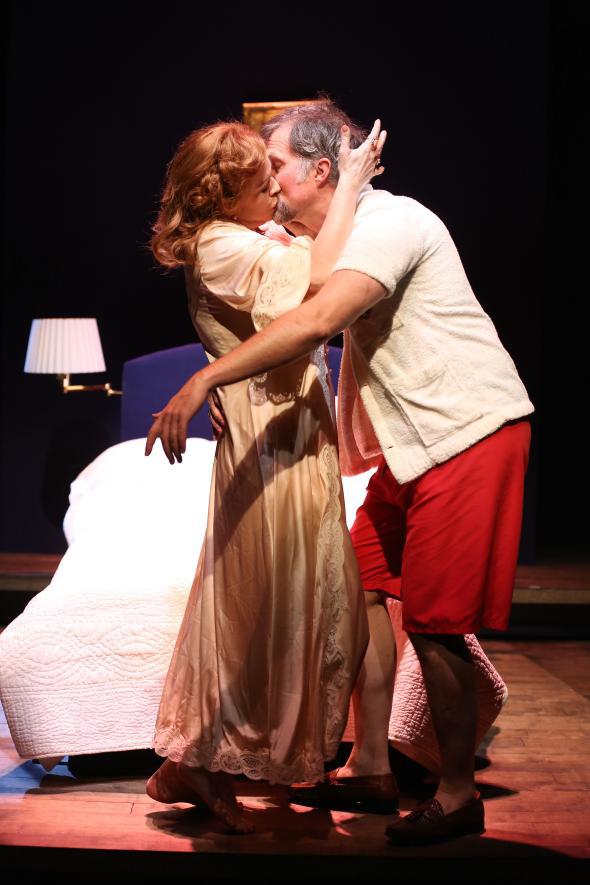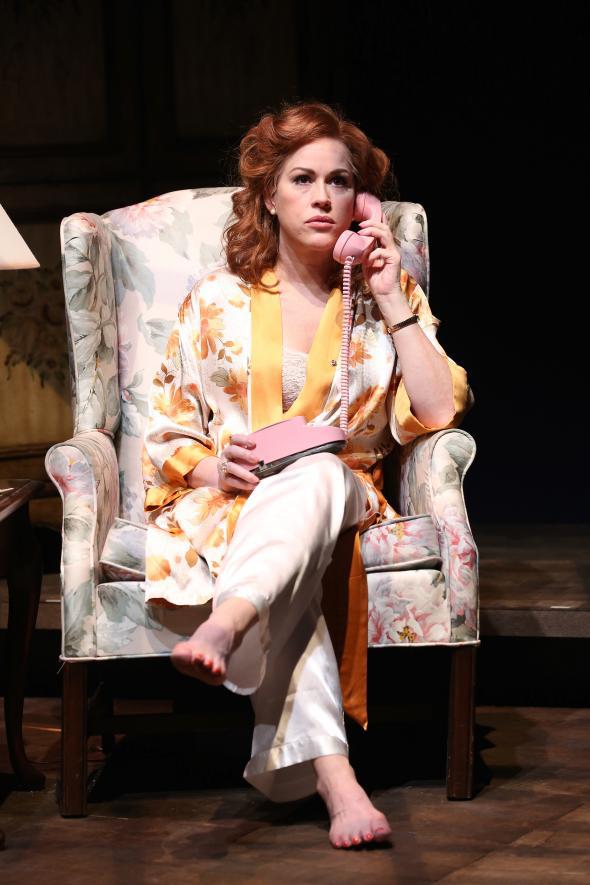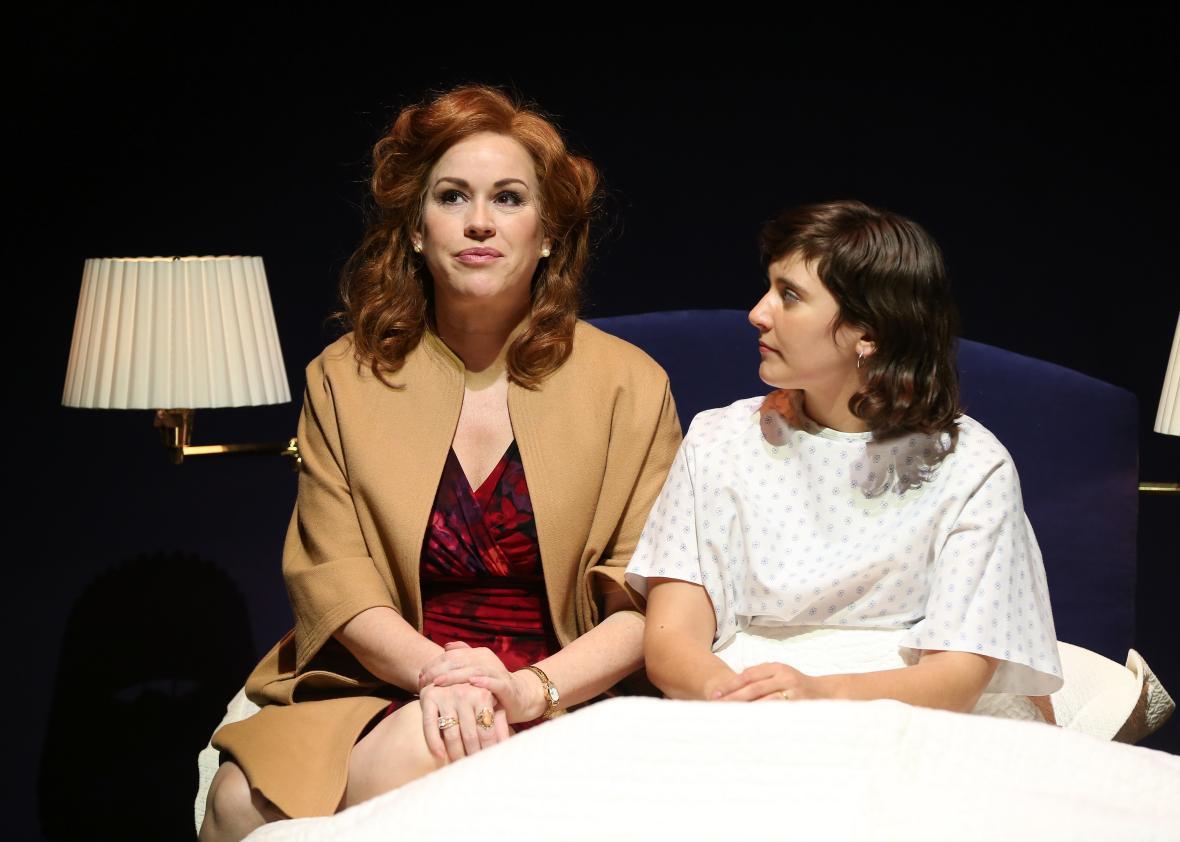Is “former poster girl for teenage angst” a term of endearment? It’s a relevant question because Molly Ringwald, whose The Breakfast Club and Pretty in Pink performances are dual pillars of the teen film canon, is now starring in an off-Broadway stage version of another 1980s relic, Terms of Endearment. She plays Aurora Greenway, the role made famous by Shirley MacLaine in the mother-daughter drama, in a new adaptation at New York’s 59E59 Theaters, now through Dec. 11. Yes, she’s old enough to play the older woman in the famous hospital freakout scene, and happy to have a meaty role to chew on between her pursuits of jazz-singing and fiction-writing. She spoke to Slate about life after John Hughes, being a mother to a teenager of her own, and why she brought a ukulele to the interview. This conversation has been edited and condensed.
Slate: Before this play, what was your relationship with Terms of Endearment?
Molly Ringwald: I saw [the movie] a lot actually when I was a teenager, when it came out. I would say I probably saw it like two or three times, because I really loved it, really loved the performances in it. And then when I signed on to do this, I sort of deliberately chose not to see it again for obvious reasons. Or maybe not so obvious reasons—but I feel like that performance by Shirley MacLaine was so incredible, it would be hard not to make every choice that she made, and I’m really trying to make it my own, based on not just the screenplay but also the book. She was quite different than the character that was in the [Larry] McMurtry novel. So I just thought it would be interested to find my own way into it. But there’s certain things that I can’t help but remember from watching it as a teenager.
I think it was really just the performances and the incredible connection between mother and daughter. I mean, at the time I was a daughter—well, still am a daughter, but I was a teenager—having that really strong back-and-forth battle with my own mother. And now, I’m the mother of a teenager and two other children, and I feel like I’ve completely come around, and I see things from the other point of view.
More on that Shirley MacLaine performance, that was so acclaimed—I think she won an Oscar for it. How did you feel about stepping into it?
I don’t want to say never, but I don’t think that I would have taken this on if it was a film. I don’t see any reason ever to remake that movie; I think you should only remake movies if they didn’t get it right the first time. But I felt like this hadn’t been done as a play, and it does exist as both a book and a movie, and I thought it would be interesting to see what could be done on stage and how it could reach a new audience and find new and different aspects of the story. Bringing back the book and incorporating different elements of the story. And the reason why I chose to do it is because there just, quite frankly, are not that many interesting parts for women. I mean, at all. No matter what age range, but particularly women that are in my age range—those parts are very few and far between. So when one of them comes along, that’s pretty great. It’s madness not to explore it, I think.
One thing you and Shirley MacLaine have in common is the red hair, and I noticed watching the play that there was some fidelity to that: For the daughter character, Emma, they also had a brunette actress, and then Flap was blond, just like he was in the movie. Do you have any theory about why the hair colors turned out that way?
I think that’s just sort of coincidence. … In the book [Aurora]’s actually more of a blonde, I think. And her hair in that movie, I think, is lighter than mine. I think it’s more strawberry blond. There’s a lot made of her hair in the book—like she’s extremely proud of her hair—and I just kind of imagined that when she was young, people would say, “Oh, she has hair like Rita Hayworth.” She takes care of it and she sets it, and then also, once everything unravels in her life, I took the thing that Shirley did, which is just letting the hair color grow out and not taking care of it in the same way.
Is this the first time you’ve played a grandmother?
No, I actually played a grandmother in The Secret Life of the American Teenager.
It’s pretty wild. I have young kids at home, and I definitely don’t feel like—in my own personal life—I am there yet. Then again, when I had the first meeting for this, one of my reservations was Well, I don’t really know if I want to play—I have to pause at that idea about playing a grandmother, and it was pointed out to me quite accurately that Aurora doesn’t see herself as a grandmother either. So it kind of fits. And she starts out around the same age that I’m at; she ends up older in more ways than one, not just chronologically. The trauma of what happens to her in her life ages her as well.

Carol Rosegg
The rest of the cast did Texas accents, but yours was different. Can you tell me about that?
Well, Aurora’s from New England. In fact, that’s one of the changes that we’re thinking about making, is incorporating some line to explain that, because I think it can be kind of confusing that she doesn’t speak with a Texas accent. But she’s from New Haven and Boston.
So that’s very much a part of the book. [For the accent], I sort of looked at accents and how people spoke, how people would have spoken had they gone to finishing school in Boston.
Your character’s wardrobe is also very fun. There’s a line in the play about how proud she is of it.
Yeah: “The selection of a tasteful wardrobe is a duty, not a past-time.” She’s very, very into the way that she looks. It’s also a different generation—if it were even, maybe 10 years earlier, she would have been the person who just wore gloves everywhere. But Aurora is very much of that—you know, you’re well put-together, you always wear nice underwear in case you get in an accident and you have to be taken to the hospital. It’s one of the struggles that she has with her daughter; her daughter just does not ascribe to that and pushes back on that. She’s really, completely of a different generation and a different time and a different place. It’s one of the arguments that they have, she thinks Emma just doesn’t keep herself up, and if you’re a woman, you should be—you know, all of that stuff that we don’t ascribe to. She should have her chairs pulled out for her, she should have doors opened for her, all of that. But of course, that’s really where she starts out in the beginning. Because I don’t think that that’s where she is by the time she’s in the hospital; she’s very much more of a person who takes things in her own hand.
It was just really important to me—I felt like Aurora’s color palette is, for me, pretty much based on this ring [the coral ring she was wearing]. Everything is very feminine, very coral, and pink. Her universe is very overly feminine and of course colorful. She’s a woman who believes you should be colorful, that you shouldn’t wear many dark colors or that’ll bring you down—another thing that I think is very generational. And of course, that changes after her daughter is diagnosed—that sort of goes out the window, and she’s just wearing stuff that’s more practical. And I also wanted it to be like, it’s her daughter who’s sick, but she’s almost sympathetically sick, in that she’s just drained of color and energy, in a way.
I noticed you have with you today—is that a banjo?
It’s a ukulele.
What is that for?
I just like to play it. It’s sort of relaxing to play. I just like to have it, I don’t know, backstage. I mean, I don’t play it that well, but I like to have it. Just a few chords—basically songs that have chords that I can play.
It seems like you have all these fun creative interests besides acting—ukulele being one of them. Are there any that you haven’t pursued yet, or that you’d like to pursue more?
Directing, I think, I’d very much like to do. And possibly directing a film that I write, maybe act in—though that’s not the most important thing. That’s probably the next step for me.
I want to make movies that I would like to see. I enjoy the occasional superhero movie! But it’s not exclusively what I want to see, and I feel like that’s what’s been offered to us, at least in the movie theater; it seems like all of the really interesting character pieces have now gone to television. But there’s something about going to the movie theater that I still really love, and I don’t want that to go away entirely. There’s a sense of community that you get from going to the movies and seeing things on a big screen, that I think would be a shame to lose entirely.
I have a bunch of different things that I’m working on, but nothing that I can really talk about. I can say that I’m still working on my second album and I’m still working on my second fiction book. And there’s a screenplay that I’m thinking about as well, so I’m kind of working on all of these things.
You talked a little bit earlier about the challenge of finding parts for your age…
I think for any woman over 25, it’s challenging. I just think that there’s not that many parts—there’s more, I think, in theater, and perhaps more in television than there are in film. But if you look at Geena Davis’ work that she’s been doing, tracking exactly how many lines women have, how many times they’re shown on camera—the fact that very often a man is shown on camera when a woman is speaking. It’s pretty remarkable, and I’m glad that there’s more attention being put on that. But I think that we really are in the minority in terms of how we’re represented. And then, of course, people of color are represented even less.
I try to ultimately only go for things that I think are interesting. But it’s true that the interesting parts are just very, very few and far between. I tell my kids this when they have parts in their school plays and stuff—Well, there are no small parts, only small players. And then I find myself reading parts that are so boring and so hackneyed. Just not interesting at all—like they’ve taken no time at all to flesh out this character. And I got really spoiled early on, being able to play parts that were complex and where the female really drove the story forward. Unfortunately, I just don’t read a lot of parts like that.
Are there any other parts that have stood out to you recently, like That was a great role for a woman.
I love just about all of the female parts in Transparent. I think they’re all written in very complex, interesting, funny, flawed ways. When I look at, particularly, the part that’s played by the older sister, I think that’s a great part. She’s funny, she’s just a total mess, but you really see the humanity. It feels to me, at least, like [Jill Soloway]’s really given creative license, and she’s able to really, truly do what she wants to do, and also it really seems to me like she uses the connection of her cast and their ability to improvise.

Carol Rosegg
What do you think we’re losing when the focus is just on parts for men?
It just seems so outdated and outmoded. As we’re gaining so much ground in other ways, it seems like—for some reason—Hollywood hasn’t kept up with that, with the times. If anything, I feel like it’s sort of gone back. I feel like there were more interesting parts for women, like Terms of Endearment or the movies Jane Fonda made. Katharine Hepburn. It just feels like there were so many more interesting parts for women, and they are so few and far between right now. I don’t really know the reason, what that backlash is about. I mean, it’s always a pendulum, I think; now we’re just in this very male-heavy—or if there’s parts for women, it seems like there’s these sort of superheroine parts. But they have to be buff and killers, you know? They have to be these fierce, almost robots. It’s just not interesting to me; it never has been. Characters, people, they way that people communicate with each other is just so much more interesting to me than all the rest of it.
Speaking of women making progress, you’ve been doing some work with Hillary Clinton’s campaign. So what has that been like? What’s your current nervousness level about the election?
I wish that I was able to do more. I was stumping for her in New England, and that was a great experience, actually going to schools and talking to undecided voters. I feel like a lot of people, particularly young voters, were still very disappointed by the fact that Bernie [Sanders] wasn’t the nominee, and they needed more time—I sort of wish that Bernie had stepped away a little sooner. But I totally admired a lot of what he talked about. Anyway, my current state of nervousness that I think that we can’t be complacent, but I’m pretty confident that she’s going to win, and I’m pretty confident that Nov. 8 is going to be a great day. I have to work—I’m going to the election night party for Hillary, but I have to work that night, so I’m going to be racing from here to there.
I just wanted to follow up on your appearance on This American Life a few years ago, when you were talking about showing The Breakfast Club to your daughter. She’s a few years older, so what it is like, now, being the parent of a teenager?
Exactly what you would imagine, I think. Probably exactly the way it is for everybody else in the world. She’s challenging, she’s moody, she’s a very normal, typical teenager. Exactly like every other teenager. Exactly like I was, really.
How do you think your experience of playing legendary movie teenagers affects things?
It does nothing. Absolutely nothing. I always thought that it would give me an edge or make me understand more; all of that just seems like it doesn’t really matter at all. I think every teenager just comes with their own issues, and there’s things that I deal with, with her, that my parents didn’t have to deal with—which is like, the internet, Instagram, and the barrage of wanting to look a certain way. All of that stuff. We didn’t have to deal with that. My parents had to deal with other issues. But basically, it all comes from the same place, which is just: Teens are moody and unpredictable and impulsive.
